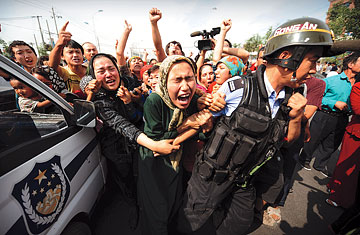
The crying game
Uighur women seeking arrested family members grappled with riot police on July 7
Xinjiang is China's most exotic region. A vast, remote landmass three times the size of Texas and studded with mountains and deserts, the province once stood at the crossroads of the ancient Silk Road. Its capital, Urumqi, is far closer to Kabul than it is to Beijing. Xinjiang's population of 20 million is one of China's most diverse, with Uighurs, Kazakhs, Mongols, Tajiks and ever growing numbers of Han Chinese. Beneath the desert sands, reserves of oil, minerals and natural gas abound.
Xinjiang is also China's most troubled region. The Uighurs, who are Muslim and of Turkic origin, are the single largest ethnic group. But over the years, their culture has undergone a whittling away, amid a steady influx of Han Chinese, who now dominate the local economy. Today, about 70% of Urumqi is Han. The result: resentment and unrest. The past decade has seen a string of bombings by suspected Uighur separatists — the U.S. has classified one organization, the East Turkestan Islamic Movement, as a terrorist one — and stern crackdowns by the Chinese authorities. Around last year's Beijing Olympics, an attack in the historic Xinjiang town of Kashgar killed 17 Chinese police. But the region's most serious outbreak of violence took place in Urumqi over three days beginning July 5, when rioting left at least 156 people dead and over 1,000 wounded.
The protests were peaceful enough at first. A crowd of some 1,000 Uighurs marched toward Urumqi's central People's Square chanting slogans about alleged police inaction after a Chinese mob recently beat to death two Uighur factory workers in the southern coastal province of Guangdong. What happened next at People's Square is unclear. Some reports have the police baton-charging or using more forceful means against the demonstrators. But the upshot was that hundreds of young Uighur men spilled onto Urumqi's streets, smashing vehicles, ransacking shops and attacking Han residents. One witness said that of more than a dozen bodies he saw, all appeared to be Han. Hospitals said some two-thirds of the wounded were Han.
The government flooded the city with thousands of police, who detained at least 1,400 people, mostly Uighurs. During an official tour for Chinese and foreign journalists, the fear and anger of both the city's Han majority and Uighur minority were palpable. A 65-year-old Han man originally from China's central Henan province said he retreated to his second-floor apartment as a mob of about 50 Uighur youths attacked a Chinese car dealership nearby. "We spent more than a day inside our house," said the retired farmer, who declined to give his name. "We were too terrified to come out." As the journalists toured the burned-out car dealership, a large group of Uighur women assembled. They demanded the return of their arrested husbands, sons and brothers. "Grandparents, children, they've all been arrested," said one Uighur woman. "I have a younger brother. He's 14, and I don't know where he is."
Things nearly turned even worse. Shortly after noon on July 7, groups of Han in their hundreds, then thousands, began mobilizing in the northern parts of the city. Armed with knives, hammers and staves, they marched toward Uighur districts in the south of Urumqi, apparently intent on retaliation. Security forces massed to prevent the Han entering the Uighur areas. The mobs would congregate and sprint to one area, then retreat and run in another direction. Tear-gas canisters exploded through the alleyways. Though there were rumors of Uighur deaths, the huge security presence managed to restore a semblance of order by the end of the day. Still, the possibility of fresh violence remained real — to the point that President Hu Jintao canceled his attendance at the G-8 summit in Italy and rushed home.
